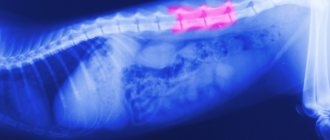In the article, I will analyze the main causes of bad breath, called halitosis, or why a dog’s mouth smells like rotten meat (fish), I’ll tell you how to treat it if it stinks from the mouth, what to do and how to get rid of the bad smell, and preventive measures at home.
What can cause an unpleasant odor?
There are a lot of possible root causes, and they can act in combination. According to veterinarians, halitosis (bad breath) in both dogs and other mammals can occur due to any disruption in the functioning of the body systems.
However, there are the most common reasons why a dog's breath smells.
Improper oral care and dental diseases
Many owners believe that there is no need to keep their pet’s teeth and mucous membranes clean - supposedly animals are not susceptible to dental diseases. This is a big misconception - it is quite possible that the dog’s mouth smells precisely because of lack of hygiene.
Dogs' teeth are arranged quite tightly. Food debris gets stuck firmly in the microscopic cracks between the molars and incisors and begins to rot. This is the first reason why a dog may have bad breath. The stench can be eliminated with the help of special devices from a veterinary pharmacy - paste and brush. It is also recommended to let your pets chew on special bones, sticks and toys to remove natural plaque. This should be done carefully: if a furry friend injures the gums, the optimal microflora will be replaced by putrefactive ones.
When the dog is inflamed, there is also an odor from the mouth. These include the following diseases: stomatitis, glossitis, gingivitis, tartar. In case of tartar, it is necessary to remove it at home or in a clinic, and in case of other diseases, contact a veterinarian for help. It is worth paying close attention to this problem, as it will significantly reduce the quality of life of the animal, and will also destroy teeth if you do not intervene in time.
Unsuitable food
Many breeders pamper their pets with something tasty. A dog’s bad breath indicates, and sometimes even screams, that food is unsuitable for it. The diet includes carrots, apples, and white cabbage - solid vegetables rich in fiber and famous for their cleansing properties. Food should be balanced and varied. You should not give dogs sweets: sugar not only destroys teeth, but also has a detrimental effect on the liver and kidneys.
A dog may also have an odor from its mouth if it has consumed some expired product. Be careful what you give to your pet. Food should not be too hot or cold when served, you should follow the eating schedule and do not use sour food.
Elderly age
Sadly, our little brothers are also getting old. And to the question why a dog has bad breath, there is a simple answer - old age has arrived. Over time, teeth begin to decay, and internal organs no longer work at full capacity. Hence the unpleasant odors. We must be especially attentive to pets that have crossed the 10-year threshold of life: carefully select their diet and regularly show them to a veterinarian.
Gastrointestinal and liver diseases
The cause of bad breath in dogs is often gastritis - this is not the least common disease among four-legged animals. There are other digestive tract disorders in which the animal will experience vomiting, diarrhea or constipation, depressed mood and lethargy. The dog will drink large amounts of water.
Problems with the liver often become the impetus for the appearance and development of halitosis. With this problem, the pet develops a sharp, specific odor from the mouth and may develop jaundice.
Parasites can be the cause of bad breath. Helminths multiply quite quickly and clog the intestines, as well as other internal organs. If parasites are found, immediately go to the veterinarian to correct the situation.
Diseases of the genitourinary system
With dysfunction of the kidneys and urinary tract, you can often encounter the aroma of sour urine from the mouth of a four-legged animal. This means that breakdown products are not completely eliminated from the body - some enter the bloodstream. There will be swelling, reluctance to eat food, problems with urination, the coat will become dull, the temperature may drop or rise. You should see a good doctor immediately.
Breathing problems
When an infection enters the respiratory system, halitosis becomes one of the accompanying symptoms. It will be accompanied by a cough, fever, and runny nose. You should quickly show your four-legged pet to a veterinarian so that complications do not begin and the disease does not become chronic.
Types of unpleasant odors and what they mean
There are different types of foul smells that a dog owner can smell. The nature of the “aroma” will help determine the possible cause of halitosis.
Rotten smell
The explanation for why a dog's breath smells like rotten meat is problems with the teeth and oral mucosa. You need to independently study the animal: check the presence of caries, the integrity of the gums, the presence or absence of plaque.
Halitosis can cause kidney disease, especially in older dogs. Kidney failure is accompanied by constant trips to the toilet and thirst.
It happens that a malfunction in the gastrointestinal tract is to blame. This is how incipient or chronic gastritis, intestinal obstruction, and feeding with low-quality food manifest themselves. It’s worth trying for a few weeks to give the animal natural food, and also walk it at least twice a day for thirty minutes.
Less commonly, a rotten aroma occurs due to respiratory problems or the onset of diabetes. It is important not to hesitate and take the dog to a veterinary hospital for initial urine and blood tests.
Acetone
Appears mainly in diabetes mellitus. It is accompanied by symptoms such as thirst, sudden weight gain/loss, lethargy and apathy, and itchy skin. If you see that small ulcers have appeared on the skin, and the animal has begun to drink a lot, then you should quickly take your pet to the hospital. Your pet will need maintenance therapy throughout its life, as diabetes is incurable. This is why it is so important to find a good specialist for professional advice.
Urine smell
If you smell the aroma of urine from the dog’s mouth, then first of all you should suspect kidney problems. It could also be a liver problem. It is important to avoid undesirable consequences - this will require thorough tests, including ultrasound and x-rays. A good doctor will be able to make the correct diagnosis and quickly eliminate the problem without it becoming chronic.
Metal or blood
If you smell an iron aroma, this cannot be normal. This is what blood usually smells like - small wounds in the mouth or larynx emit a specific aroma. Take care to find a canine dentist and make an appointment with him. If it is painful for an animal to eat or breathe, under no circumstances should you hesitate.
Puppies may bleed if they have difficulty changing teeth. If you have an adult dog, you will need to take several tests, including stool tests for blood.
Fishy smell
Sometimes the owner notices the smell of fish. This may be the result of eating food that is too flavorful (and often prohibited for dogs) or getting it stuck between the teeth.
A similar aroma can be a signal of gum and oral cavity disease. Examine the gums for inflammation and ulcers - in case of redness and especially suppuration, consult a doctor.
Some disruptions in the endocrine system lead to the appearance of halitosis. Here you cannot do without a lot of tests and the help of a good, experienced veterinarian.
Other symptoms accompanying mouth odor
A specific aroma may be accompanied by various symptomatic manifestations: weakness, weight loss or gain, changes in the pet’s activity, refusal to eat, severe thirst. Any deviation from usual behavior indicates that prompt consultation with a specialist is required.
What should alert the owner:
- profuse drooling;
- slurping while eating, awkwardness when grabbing food or toys;
- drowsiness and lethargy;
- the active pet stopped being mischievous, but the calm one, on the contrary, became too nervous;
- problems with urination and bowel movements;
- the coat becomes bad, dull, the skin flakes;
- unmotivated aggression appears;
- the pet refuses its favorite treats and adored games.
It is worth observing your pet for a day, maximum two. If one of the above symptoms is associated with halitosis, make an appointment with a veterinarian.
When does a fishy stench signal trouble?
If your dog suddenly begins to emit an unpleasant, pungent fishy odor, pay attention to the health and behavior of the pet. Owners should be alert to the following symptoms:
- dull, faded, brittle wool;
- the presence of foci of inflammation on the skin, ulcers, wounds;
- accumulation of wax, black plaque on the ears;
- sudden weight loss, loss of appetite;
- low activity, depressed state;
- severe itching;
- problems with chewing food;
- unstable stool, nausea, vomiting;
- unpleasant odor of urine, discoloration, frequent painful urination;
- ulcers, wounds on the oral mucosa;
- ear diseases (ear mites);
- fungal infections (mycoses);
- discharge from the nose, eyes.
What does the vet recommend?
What to do if your dog has bad breath? If you realize that your furry friend needs the help of a doctor, then you should take him to an appointment. First, the specialist will examine the animal, ask you about its lifestyle, nutrition, diseases, and other important things.
If pathologies of internal organs are suspected, appropriate studies will be carried out: blood and urine tests, x-rays, ultrasound or tomography, checking for infection with viruses or bacteria. They will also conduct an initial examination of the jaw and the condition of the teeth and gums.
If you need to remove tartar, a specialist will do it. Next, you just need to maintain oral hygiene. This procedure is painlessly performed using ultrasound, although large or restless animals are given anesthesia. After all, the oral cavity will be treated with an antiseptic solution and special pastes that protect the enamel.
If an oral injury is detected, the doctor will remove the foreign object and stitch the wound, if necessary. After this, you should constantly perform antiseptic treatment on the recommendation of a doctor.
If you have a gastrointestinal tract disease, you need to not only eliminate the unwanted aroma, but also follow a diet after everything. The veterinarian will tell you how to correctly create a diet - most likely, at first you will have to switch to natural food. It will consist of viscous porridge and low-fat meat broth.
If you have diabetes, you need to constantly monitor your glucose levels within acceptable limits. The dog's quality of life will directly depend on the level of care of the owner. It is necessary to use not only medications prescribed by a doctor, but also follow a special diet.
In case of parasitic infection, the doctor will help remove the helminths. After this, you need to give sorbents to cleanse the body. In advanced situations, IVs are prescribed.
Does it smell like urine?
In this case, take the “patient” to the veterinarians without delay. The fact is that the smell of urine is caused by ammonia. In fact, it is precisely this smell that we associate with this disgusting smell. So, in a dog, ammonia is formed in the digestive tract due to serious diseases of the liver and/or kidneys. Remember, the animal itself will not tell you about a certain discomfort, lethargy, fatigue, and you will not always be able to determine this. Often, diseases of internal organs are practically asymptomatic. Therefore, regularly see specialists.











